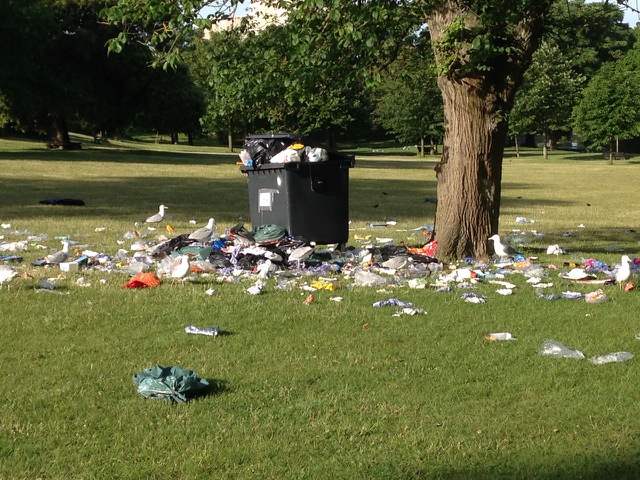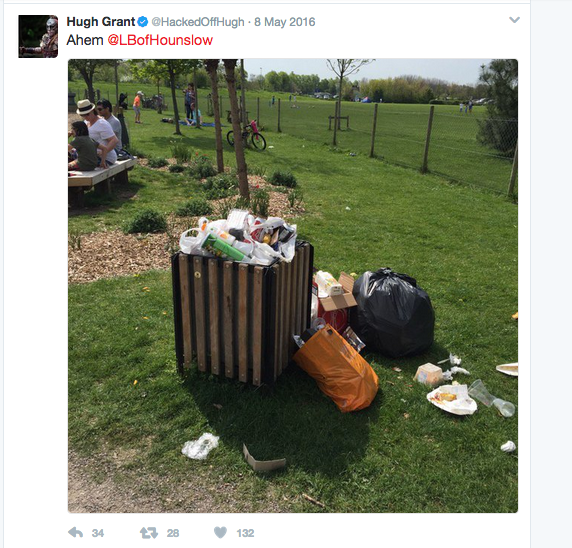Changing Our Attitude To Rubbish
Posted Sunday July 9, 2017
Take it home with you. That is the advice we should give to all groups planning picnic parties and BBQs in the park this summer.

That’s right. Once you’ve finished, pack up all the wrappers, bottles and cartons you brought with you, bag them up, take them home and use your regular rubbish and recycling system to dispose of your stuff responsibly. ‘Carry in, carry out’ should be our mantra.
This request might come as a shock to some people. After all, there are bins in the park, right? What could possibly be wrong with using them?
Because regular park users know it is a system that just doesn’t work. On a warm summer’s day there are at least half a dozen different groups, with kids, guitars and beers, out having a great time in the park. Terrific – that’s what our public parks are all about. The first group gathers their rubbish, crams it all into two plastic supermarket bags, and stuffs them both into the bin. Then the next group manages to squeeze one bag in, but now their second bag doesn’t fit, so they stick it on top. Repeat. Pretty quickly, there are overflowing rubbish bins in the park. Self-righteous park users, aiming to use the bin, feel affronted since they tried to do the right thing. They will blame the council for not doing their job properly. They will often just leave their bags next to the bin because, according to studies, “existing litter is commonly sited as the biggest reason why people think it’s OK to litter.”
Result: overflowing mess, disgust, horror and complaints to the council.

That is why we must change our behaviour. It’s just not reasonable for us to treat the park as a large scale waste removal device for our social events. Use the bins for kids’ sweetie wrappers and dog poo bags, not large amounts of rubbish. By not taking our rubbish home, we are causing the problem. There was a line in the council’s recent Open Spaces Strategy report which said: “Between 20-30% of garden staff time is spent picking up the public’s litter during the summer period.” The estimated annual cost of litter collection in the UK is most of £1bn. So littering is not just inconsiderate, it’s shockingly expensive too.
Last summer, film actor Hugh Grant sent out this message on Twitter, a typically subtle, self- effacing, just-doing-my-bit tweet from the star of Love Actually:

The council, which evidently follows Hugh’s tweets in real time, fell over itself to oblige: “Thanks Hugh for pointing this out, we’ll get our team on it asap.”
Bad council! But less starstruck citizens wrote more considered responses on Hugh’s twitter feed. “Selfish littering. Why don’t people take their rubbish home?” said one. “What about the picnickers them-bloody selves? I’d carry my rubbish to my bike or car rather than do that,” said another.
They understood what Hugh does not: overflowing bins in summer will remain us with until park users change their behaviour. Can that happen? Yes, it can. We have all changed our behaviour significantly in recent years to address issues such as smoking in public, using plastic shopping bags and clearing dog mess. We change, we adjust, and Britain is much the better for it.
In the US, the Grand Canyon National Park has taken the radical step of removing many of its public bins altogether. Visitors are given a very clear directive: “Carry out your trash. Burning, burying, or leaving trash or toilet paper is prohibited. No exceptions.” They are not messing around. A man who dropped rubbish in the Colorado River during a Grand Canyon rafting trip was vigorously pursued, successfully prosecuted and fined $2,500.
“The National Park Service understands that these adjustments will require some thought and changes in behaviour but hopes visitors will appreciate the commitment the park has made,” said a spokesman.
There are similar examples closer to home. The Rockery in Preston Park is maybe the most popular garden feature in the city, an elegant and well-kept park that has delighted visitors for generations. Seven years ago, they removed all the bins in The Rockery. Andy Jeavons, the CityParks manager who initiated the move writes, “I have noticed no increase of litter at all.”

The Rockery, Preston Park. Spot the bin.
Jeavons is clearly skeptical of the public’s demand for more bins.
“So how many bins are enough? Another 100? 200, perhaps? Because there must’ve been 200 bags of rubbish [in Preston Park this weekend].”
If they put in more bins everywhere, says Jeavons, “people will then start complaining about the waste of money and how awful they look.”
Are fewer but larger bins the solution? Apparently not. “The problem with bigger bins,” explains Jeavons, “is that people will cram more stuff into them, which is makes it very heavy to lift out the bags. We’re not geared up to handle large wheelie bins, and they have to be chained up. Also, people put red hot barbeques in them, believe it or not.
“We don’t have the time or the money to have someone just picking litter and emptying bins. The staff in Preston Park have a massive area to cover which includes housing, sports and other parks in the area.”
The conclusion that Jeavons and others are coming to is that changing people’s behavior is the key. That may sound an impossible or unrealistic goal, but that is what they are trying to do in the US National Parks. And if you read the busy local threads discussing litter on Facebook, as many as 60 per cent of respondents take the view that problem is people, not the council. Here is a typical comment: “If I have rubbish to throw away and the nearest bins are full up, I just hold on to it until I find a less full bin or take my rubbish home with me. This [littering] is just pure laziness.”
Perhaps the best comment on ‘behaviours’ came from Ryan Attwell, Social Science Coordinator at the Yellowstone National Park: “The least studied mammal in Yellowstone is humans.”
So next time you approach an overflowing bin in Queens Park, don’t blame the council. Take responsibility for your own rubbish, and take it home with you.
– Conrad Brunner
[This article appeared in the July edition of Queens Park Living magazine]